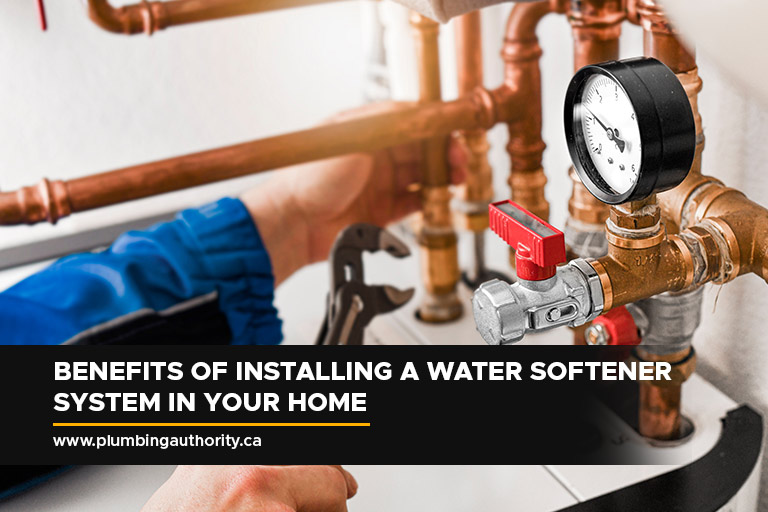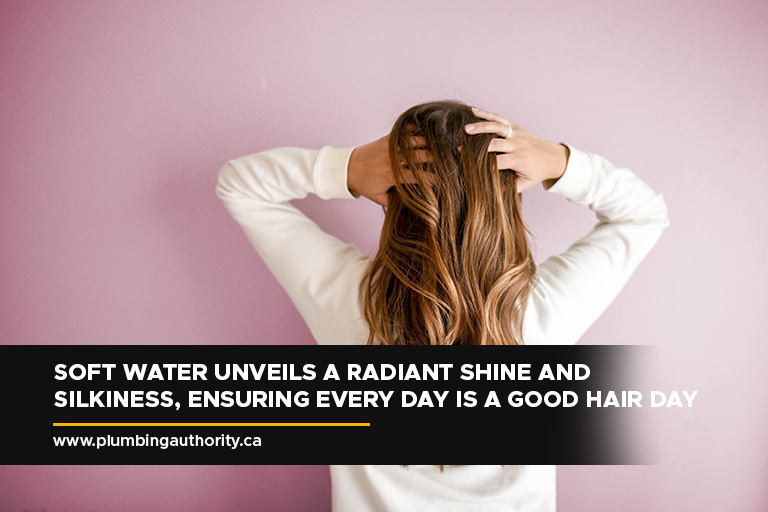
Water is essential in our daily lives, but not all water is created equal. If you’re like most homeowners, you might not be aware of the potential problems hard water can cause in your home. Hard water contains a high concentration of minerals like calcium and magnesium. While it’s not harmful to your health, it can wreak havoc on your plumbing, appliances, skin, and hair.
In this article, we will explore the benefits of installing a water softener system in your home, helping you decide whether it’s worth the investment.
What Is a Water Softener?
A water softener is designed to get rid of the minerals that cause hardness in water, primarily calcium and magnesium ions. It does this through ion exchange, replacing the hard minerals with sodium or potassium ions, resulting in “softened” water. Softened water is gentler on your plumbing and appliances and has several advantages over hard water.
Signs of Hard Water

Hard water is harsh to the skin causing skin problems like dryness and itchiness
It’s crucial to recognize the signs of hard water in your home. So, what are the signs of hard water? Here are some common indicators of hard water in your home:
- Soap Scum
Hard water makes it difficult for soap to lather, leaving a soapy residue, also known as soap scum, on your sinks, showers, and dishes.
- Scale Buildup
Over time, the minerals in hard water can accumulate inside your pipes and appliances, causing scale deposits that can reduce water flow and efficiency.
- Dry Skin and Hair
Hard water can remove the natural oils in your skin and hair, leaving them dry, itchy, and lifeless.
- Spots on Glassware
Hard water leaves behind spots and streaks on your glassware, making them appear cloudy and unclean even after washing.
- Reduced Appliance Lifespan
The scale buildup in appliances like water heaters and dishwashers can shorten their lifespan and increase energy consumption.
Now that we’ve identified hard water vs soft water, let’s explore the different types of water softeners available.
Types of Water Softeners
There are primarily two types of water softeners commonly used in homes:
- Ion Exchange Water Softener
The ion exchange water softener is the most traditional and widely used type. It operates by replacing the calcium and magnesium ions with sodium or potassium ions through a resin tank. While effective, it requires occasional salt or potassium chloride regeneration to maintain its softening capacity.
- Salt-Free Water Softener
Salt-free water softeners, also known as descalers or conditioners, do not remove minerals from the water but change their chemical structure, preventing them from adhering to surfaces and forming scale. These systems are low-maintenance and are an excellent option for those looking to avoid the use of salt.
Benefits of Water Softeners

Soft water unveils a radiant shine and silkiness, ensuring every day is a good hair day.
When investing in a product, it is crucial to understand the particular benefits it offers. Here, let’s explore the numerous benefits water softeners offer to homeowners:
- Save money on cleaning products
With softened water, you’ll need less soap and detergents to clean your dishes, laundry, and yourself. This reduction in the use of cleaning products can lead to significant savings over time.
- Improve the efficiency of your water heater
Scale buildup in your water heater can reduce its efficiency and lifespan. Softened water prevents scale formation, allowing your water heater to work more efficiently and last longer.
- Help treat skin conditions
Switching to soft water can alleviate symptoms if you or your family members suffer from skin conditions like eczema or dry skin. The gentler nature of soft water is less harsh on your skin, promoting healthier and more comfortable skin.
- Reduce cleaning time
Cleaning hard water stains and soap scum can be a time-consuming task. Softened water eliminates these issues, making cleaning more efficient and less tedious.
- Cleaner laundry and dishes
Softened water ensures that your clothes and dishes come out cleaner and brighter, as there are no mineral deposits to trap dirt and detergent residue.
- Tastier food and drink
Cooking with softened water can enhance the flavour of your food and beverages, as hard water minerals won’t interfere with the taste.
- No more bad hair days
Hard water can leave your hair feeling dull and brittle. However, the benefits of a water softener on hair are remarkable. Soft water helps hair maintain its natural shine and softness, significantly reducing the chances of experiencing those frustrating bad hair days.
- Protect your appliances
Water-using appliances like dishwashers and washing machines benefit from soft water, as it prevents scale buildup, prolongs the life of your appliances, and reduces maintenance costs.
- Luxurious baths and showers
Enjoy the luxury of soft water in your baths and showers. Soft water lathers easily with soap, leaving your skin refreshed and your hair silky smooth.
- Streak-free car washes
If you like to wash your car at home, you’ll appreciate the streak-free shine that soft water provides. No more battling water spots and streaks on your vehicle’s finish.
Alternatives to a Water Softener
While water softeners offer numerous benefits, they may not be suitable for everyone. Here are a couple of alternatives to consider:
- Water Conditioner or Scale Inhibitor
Water conditioners or scale inhibitors are salt-free alternatives to traditional water softeners. They change the structure of minerals in the water to prevent scale buildup without removing them entirely. This option is maintenance-free and eco-friendly.
- Reverse Osmosis System
If you’re concerned about the quality of your drinking water and want to remove minerals, contaminants, and impurities, a reverse osmosis system might be a suitable choice. While it doesn’t soften your home’s water, it provides purified drinking water from a dedicated faucet.
Is it worth it to install a water softener? The simple answer is yes. Installing a water softener system in your home offers a multitude of benefits that make it a worthwhile investment. From saving money on cleaning products to protecting your appliances and improving the overall water quality in your home, the advantages of soft water are undeniable. If you’re tired of dealing with the hassles of hard water, consider contacting a plumber in Caledon to explore your options for a water softener system. The long-term benefits for your health, comfort, and household budget make it a decision worth considering. Don’t let hard water continue to cause issues in your home when a water softener can provide a lasting solution. Contact Plumbing Authority at 647-992-7473 today for expert plumbing solutions and enjoy worry-free plumbing in your home!




